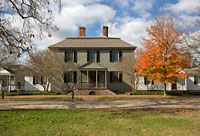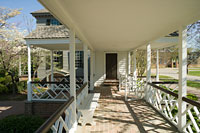Page content
Robert Carter III (1728 - 1804)
Robert Carter III was the son of Robert Carter II of Nomini and grandson of Robert "King" Carter. His father died when he was four years old and his uncles John, Landon, and Charles Carter acted as his guardians. His mother’s second husband was Colonel John Lewis of Warner Hall in Gloucester County. Robert III entered the Grammar School at the College of William and Mary when he was nine years old. When Robert Carter III reached his majority, he became the master of 70,000 acres of land and many slaves. He then went to London for two years where he was admitted to the Inner Temple for the study of law and enjoyed the metropolitan life of London. Nonetheless, when he returned to Virginia in 1751, his cousin John Page thought him "inconceivably illiterate, and almost corrupted and vicious."
In the 1750s, Carter lived at his father’s house, Nomini Hall, in Westmoreland County, where he managed his vast agricultural and commercial holdings. He improved his education by amassing an impressive library and reading history, law, and philosophy as he continued to do for the rest of his life. In 1754, he married Frances Anne Tasker (1738-1787) who was ten years younger than he. Her father had been a member of the Maryland Council for 32 years. Robert and Frances Carter had seventeen children, of whom ten were living at the time of her death.
Robert Carter stood for election to the House of Burgesses twice but was not elected by the freeholders of his county. In 1758, at the age of 30, he was appointed to the Virginia Council where he served until 1772 under governors Dinwiddie, Fauquier, Botetourt, and Dunmore.
In March, 1761, Carter moved his large family to Williamsburg, into the house built by his grandfather next to the Governor's Palace. There he took part in the critical political discussions and decisions pertaining to the role of British authority in Virginia before the Revolution. During this period he became part of the social and intellectual circle that influenced the young Thomas Jefferson, including George Wythe, Governor Francis Fauquier, and William Small, Professor of Mathematics at the College of William and Mary. These cultivated gentlemen exposed both Jefferson and Carter to Enlightenment ideals and rational religion. During this time, Carter enrolled Dennis, an enslaved boy, in the Bray School in Williamsburg, where he learned to read the Bible and other religious materials. Later, after the family returned to Nomini Hall, Dennis’s father received permission from Carter for Dennis to attend the classroom led by Philip Vickers Fithian, the tutor for Carter’s own children.
In 1772, Carter returned to private life at Nomini Hall. There he managed his scattered lands and some 350 slaves. Near the end of the colonial period, he remained circumspect about his allegiances and he did not volunteer for political or military service during the Revolution. He did, however, sign the Virginia loyalty oath and supported the non-importation agreements drawn up by the First Continental Congress.
Though he was reluctant to commit entirely to the patriot cause, in matters of religion, Carter was a committed, devoted seeker of truth. The first significant step in his religious odyssey was his withdrawal from the established church in 1776. He became an adherent of rational religion, which caused him to doubt the divinity of Christ and to assert that God was not directly involved in earthly matters. Later he reversed himself, as further reading convinced him that Jesus was divine and that the Bible was the inspired word of God. He became a very active Baptist in 1778, and Nomini Hall became a center for itinerant Baptist preachers. Carter also permitted his slaves to attend Baptist meetings held near Nomini Hall.
In 1788 he began to question the Baptist faith, and he turned to the writings of Emanuel Swedenborg, the scientist and religious mystic who advocated complete freedom of choice for Christian believers and stressed the close relationship between the spiritual and material worlds. Swedenborg’s adherents formed the Church of the New Jerusalem.
But the most radical action of this grandson of Robert "King" Carter was his plan to free all of his more than 500 slaves during his lifetime. In 1788, he wrote Elder John Rippon of London, "Let us unite in prayer to correct this error [slavery]," adding that "tolerating slavery indicates great depravity of mind." In 1791, he executed a deed of emancipation, by which all of his slaves were freed as rapidly as Virginia state law permitted.
After providing for the liberation of his slaves and turning over the management of his plantations to others, Robert Carter left Nomini Hall in 1793 (six years after the death of his wife) for Baltimore, Maryland, a center for followers of Swedenborg. He died there in 1804, at age 76.

